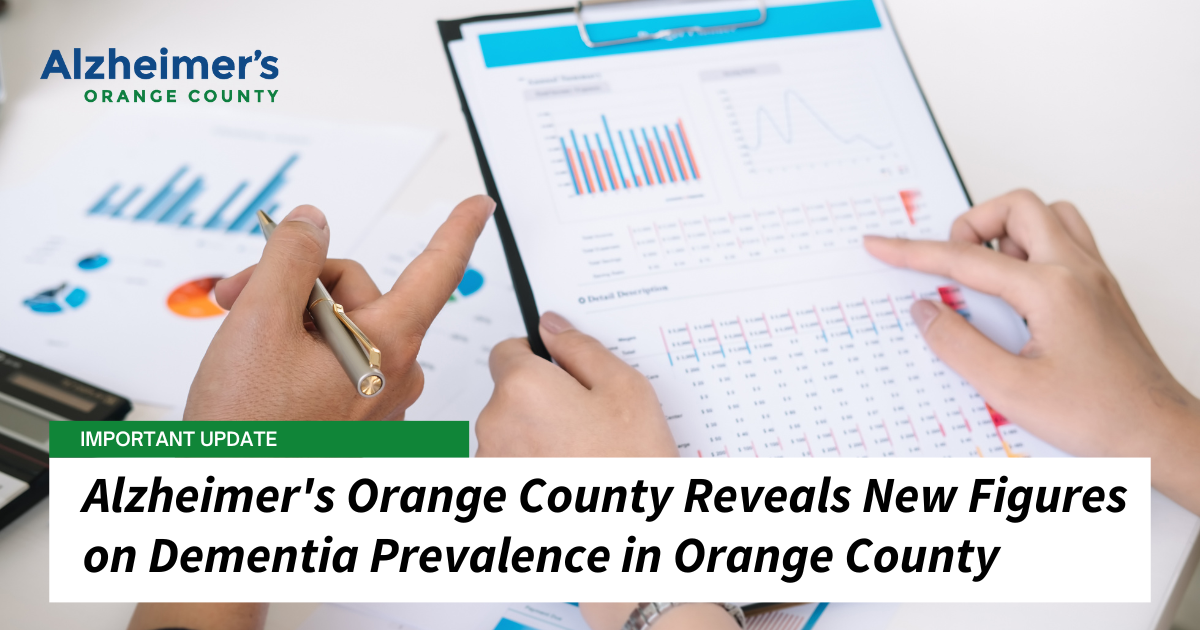Irvine, Calif., April 24, 2022 – Alzheimer’s Orange County has released new figures on the prevalence of dementia and mild cognitive impairment (MCI) in Orange County, shedding light on the scope and severity of these conditions in the local community.
According to the data, more than 164,000 people in Orange County live with dementia or MCI, representing a significant increase from previous estimates. In 2014, AlzOC released a similar estimate stating that 84,000 Orange County residents either have or are at immediate risk of dementia. The new statistics underscore the urgent need for increased awareness, resources, and support for those affected by dementia and their families in the face of the growing senior population.
“National and state data available consistently tells us one thing about dementia: more people are being affected. This is an especially urgent issue for Orange County, considering our population of people 65 years or older is increasing faster than anywhere else in California,” said AlzOC President and CEO, Jim McAleer.
To prepare this estimate, AlzOC applied widely published dementia prevalence figures to federal census data and County senior statistics to extrapolate the number of people with some form of dementia in Orange County and the number of people with mild cognitive impairment (MCI)—an early form of memory loss.
The statistics provide a picture of a current view of the state of dementia in Orange County and demonstrate a significant increase in the number of older adults affected by some form of cognitive impairment.
- 164,346 Orange County residents are estimated to have MCI or dementia—nearly twice the number of the 2014 estimate released almost a decade ago
- 34,780 Orange County Latinos 65+ have dementia
- 16,749 Orange County Caucasians 65+ have dementia
- 9,919 Orange County Asian-Americans 65+ have dementia
According to a representative study of cognitive impairment prevalence from Columbia University, 10% of U.S. adults over 65 years old have dementia, and another 22% have MCI.
Although not all cases of MCI lead to dementia, those living with it are at a greater risk for developing dementia. The National Institute on Aging (NIA) estimates that 10 to 20% of people aged 65 or older with MCI develop dementia over a one-year period.
McAleer and AlzOC developed the report. Gender and younger onset dementia or dementia occurring before 65 have not been factored into these figures.
“The latest figures on dementia prevalence in Orange County are alarming and demand our attention. With over 164,000 people affected by dementia or mild cognitive impairment, we face a public health crisis requiring immediate action. The impact of these conditions extends far beyond the individuals themselves, affecting their families, caregivers, and communities. It is imperative that we work together to increase awareness, provide support and resources, and advocate for policies that address the needs of those living with dementia and their loved ones,” stated McAleer.
AlzOC is located at 2515 McCabe Way, Suite 200, Irvine, CA 92614. For more information, visit www.alzoc.org.
To view more dementia statistics and other related facts, visit www.alzoc.org/facts-and-stats/oc.
The data presented in this release used the following sources to calculate its Orange County dementia prevalence estimates.
Alzheimer’s Association. (2020). Race, Ethnicity, and Alzheimer’s. https://aaic.alz.org/downloads2020/2020_Race_and_Ethnicity_Fact_Sheet.pdf
Columbia University Irving Medical Center. (2022, October 24). One in 10 Older Americans Has Dementia. https://www.cuimc.columbia.edu/news/one-10-older-americans-has-dementia
U.S Census Bureau. (2022, July). Quick Facts : Orange County, California.
https://www.census.gov/quickfacts/orangecountycalifornia
USA Facts. (2022, July). Our Changing Population: Orange County, California. https://usafacts.org/data/topics/people-society/population-and-demographics/our-changing population/state/california/county/orange-county


